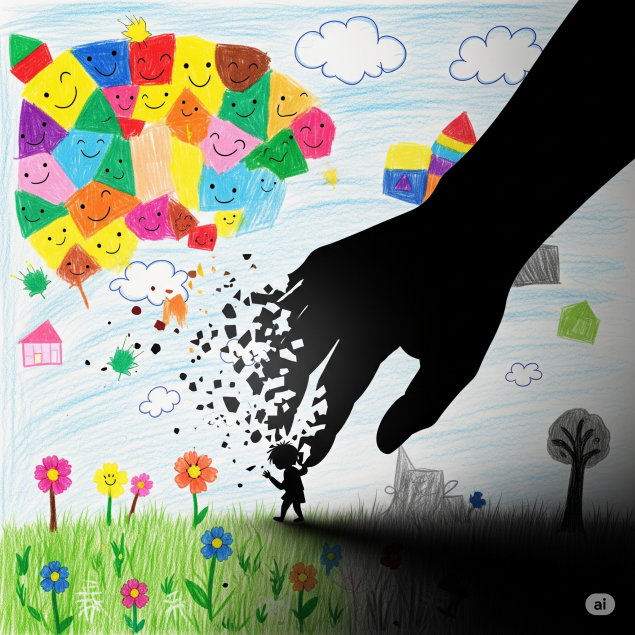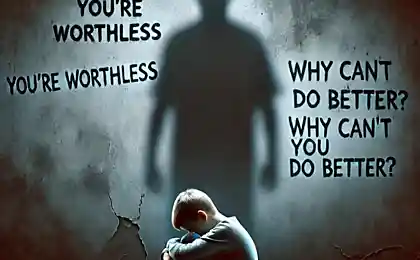157
4 basic actions that ruin the psyche of a child: accuse, shame, condemn, devalue

The broken mirrors of a child’s soul are a metaphor for four destructive actions.
Every parent, present and future, dreams of raising a happy, confident and harmonious person. We strive to give our children the best, protect them from adversity and prepare them for life. However, sometimes, in an attempt to educate, teach or correct, we perform actions that, like invisible splinters, penetrate the fragile child psyche, leaving deep, bleeding wounds. These wounds may not heal for years, affecting self-esteem, relationships, and even success in future adulthood.
Today we will talk about four such minefields that parents unconsciously create in the way of their children: blaming, shaming, condemning and depreciating. These four actions seem mundane and perhaps even "educational" in the eyes of some. But in fact, they have a destructive power that can undermine the foundation of a healthy personality.
Let’s dive into this topic to understand the mechanisms of these actions, learn to recognize them and, most importantly, find constructive alternatives that will help us build strong, trusting relationships with our children based on love, respect and understanding.
Accusation: Invisible Self-Esteem Blow
Imagine a little Misha who accidentally broke his mother’s favorite vase. The first reaction of an emotional mother may be a cry: “Misha, you broke the vase!” Why are you so clumsy? You always ruin something! What does the child hear at this moment? He hears not just a statement of fact, but a direct accusation, which immediately turns into a criticism of his personality. Instead of realizing the mistake and the possibility of correcting the situation, Misha receives a label: “clumsy”, “damage”.
It's important to understand: Accusation is not just an indication of error. It is the shifting of all responsibility and blame onto the child, often with emotional coloring and generalizations that hurt his sense of self.
When a child is constantly accused, he begins to believe that he is inherently bad, guilty, incapable. It forms what's called the "learned impotence"The child loses motivation to act because any action is perceived as a potential source of new guilt. He is afraid to try new things, to make mistakes, to express himself. As a result, he can become a passive, anxious, insecure adult who is always looking for blame and does not take responsibility for fear of being blamed.
How do you avoid prosecution?
- Focus on action, not personality: Instead of “You broke the vase!” say “The vase broke.” Then move on to the discussion of consequences and possible solutions: How can we fix this? ?
- Use "I-messages": Express your feelings without blaming the child. “I am upset because the vase, which is very dear to me, has broken. ?
- Suggest a solution: "Let's remove the shards together," "How can we avoid this in the future?"
- Distinguish between error and malice: Children often make mistakes by accident, out of curiosity or lack of experience. Blaming them for this is unfair and counterproductive.
Shame: A painful blow to dignity
Shame is a tool that, unfortunately, is very often used in education, sometimes even with well-intentioned intentions: “Look how dirty you are, everyone is looking at you!”, “Are you ashamed to behave like this?”, “Such big boys / girls do not cry like this!”. The purpose of such phrases is to make the child feel bad about his behavior, hoping that it will change him for the better. But the effect is exactly the opposite.

Loneliness under looks: Shame isolates and makes the child feel inferior.
Shame strikes at the very center of the child's personality, his sense of self-worth. It makes him feel not just bad because of the act, but a “bad” person in general. The child begins to associate himself with shame, to believe that he is not worthy of love and acceptance. This can lead to:
- Low self-esteem: The child considers himself unworthy, ugly, stupid.
- Isolations: Avoid communication so as not to face new shame.
- Perfectionism: Strives to be perfect to avoid judgment, which leads to constant stress.
- Aggression or passivity: In an attempt to protect themselves from shame, the child may either be aggressive or completely self-contained.
How do you avoid shame?
- Focus on behavior, not personality: Instead of "Are you ashamed?" say, "I see you're upset." Let’s think about how we could have done differently.
- Explain the consequences, not label them: “When you scream, others get upset” instead of “You’re a disgrace!”
- Teach empathy: How do you think the other person feels when you do that? ?
- Give me an opportunity to correct: “What can you do now to remedy the situation? ?
An example from life: A little girl on the playground dropped ice cream. Instead of shaming her for being sloppy, her mom said, "Oh, the ice cream's gone!" It's okay, it happens. Let's find a napkin to wipe the pens and go buy a new one. This creates a healthy attitude to mistakes and teaches children to solve problems constructively.
Conviction: Sentence without right of appeal
Conviction is a step beyond accusation. If the prosecution establishes the fact of guilt, the conviction pronounces the sentence, putting a label and predicting the future. “You never get anything done!”, “You never get it done!”, “You always get it wrong!” These phrases, spoken in the hearts or even as an “educational measure,” have enormous destructive power.
Condemnation deprives the child of faith in himself and his powers. It kills the initiative, the desire to try and develop. The child begins to believe that he is truly a “loser,” “unable,” or “useless.” This leads to:
- Fear of failure: The child is afraid to even start something, not to confirm the verdict.
- Lack of motivation: Why try if “nothing will work” anyway?
- Dependence on someone else's opinion: The child is constantly looking for approval from the outside, because he does not have his own inner core.
- Aggression or rebellion: In adolescence, conviction can provoke a strong protest and a desire to do everything to spite.
How do you avoid judgment?
- Focus on the process, not the outcome: Praise the effort, the effort, even if the result is not perfect. “I can see how you’ve tried to build this tower!”
- Provide constructive feedback: “It could have been done differently to make it stronger. Want me to show you how?
- Belief in the child's potential: Show that you believe in his abilities, even if something is not working right now. “I know what you can do if you practice a little more. ?
- Separate the action from the person: “You did the wrong thing, but you’re a good kid.”

Erasure of the Future: Condemnation extinguishes the light of a child’s individuality and potential.
Depreciation: Suffocation of Emotions and Feelings
Depreciation is perhaps the most insidious of the four, because it attacks the very essence of human existence: the right to one’s feelings and emotions. “Why are you upset about such nonsense?”, “Boys don’t cry”, “No whining, nothing terrible happened”, “It’s just a toy, why are you so worried about it?”
When parents devalue a child’s feelings, they send a clear message: “Your emotions don’t matter.” What you're feeling is wrong. You have no right to these experiences. This leads to the child learning to suppress their emotions, ignore them or be ashamed of them. In the long term, this can lead to:
- Inability to understand and manage your emotions: The child does not know how to react to stress, sadness, anger.
- Psychosomatic diseases: Repressed emotions find their way through the body.
- Relationship problems: Inability to express feelings prevents you from building deep and trusting relationships.
- Low empathy: If my feelings don't matter, so do others' feelings.
- Feelings of loneliness and misunderstanding: The child feels isolated because no one understands his inner world.
How to avoid depreciation?
- Acknowledge and name your feelings: "I can see you're upset," "You're probably very angry right now."
- Let the child live the emotion: Do not rush him, do not force him to “contain.” Just stay close.
- Learn constructive ways to express emotions: “You can cry when you’re sad,” “You can draw your anger,” “Let’s take a deep breath if you’re very angry.”
- Show that all feelings are normal: There are no “good” or “bad” feelings. What matters is how we treat them.
- Share your feelings: “I get angry sometimes, that’s okay.”
The golden rule: “Be wrong, but be honest with yourself and the world.” Let your child make mistakes and experience the full range of emotions. This is the foundation for the formation of a healthy and stable psyche. Emotional intelligence is the key skill of the twenty-first century, and its development begins with the recognition and acceptance of all emotions.
How to change your approach: practical recommendations and life hacks
Knowing that we are doing something wrong is the first and most important step. Changing habitual patterns of behavior can be difficult, but it is absolutely possible. Here are some practical tips to help you build a healthier and more harmonious relationship with your children:
1. Mindfulness and self-observation
- Keeping a diary: Try to mark the moments during the day when you catch yourself wanting to blame, shame, condemn or devalue. Write down your words and your child’s reaction. This will help you see the patterns.
- "Stop word": Talk to yourself or even your partner about a “stop word” or gesture that will remind you to stop before you say something destructive.
- Pause: Before you react, take a deep breath and exhale. Give yourself a few seconds to think about your answer.
2. Developing empathy
- Put yourself in the place of a child: Imagine that you are a small, inexperienced person who only knows the world. How would you like to be treated?
- Active hearing: When a child talks or shares experiences, listen carefully, without interrupting or judging. Show that you can hear it and understand it.
- Reflection of feelings: Repeat your child’s words or name their feelings so they know you’ve heard them. “I understand that you are upset,” “You must have been very hurt.”
3. Constructive communication
- Focus on solutions: Instead of finding the culprits, focus on how to fix the problem or fix the situation.
- Positive reinforcement: Notice and praise the child for his efforts, for initiative, for attempts. “Good for you to try!”, “I can see how hard you tried!”
- Treaties and rules: Set clear, understandable rules and the consequences of their violation. Explain why these rules are important.
- Open dialogue: Encourage your child to ask questions, express their opinion, even if it is different from yours.
4. Working on yourself
- Admitting your mistakes: If you say something you regret, apologize to your child. This will show him that it is okay to be wrong and that it is important to be able to admit your mistakes.
- Seeking support: If you find it difficult to cope with emotions or change behavioral patterns, seek help from a psychologist or parenting specialist.
- Reading and learning: Study the literature on child psychology, watch webinars, attend trainings. Knowledge is power.
Don't forget: You are a prime example for your child. The way you treat him shapes his inner world and his attitude toward himself. Let your parenthood be a source of strength, confidence and love for your children, not a cause of hidden trauma and pain. Investing in a child’s mental health is the most valuable investment in their future.
We all make mistakes. What matters is not that we are wrong, but how we respond to those mistakes and how we learn from them. Our goal is not to become perfect parents, but to become good enough, loving and aware. Parents who are able to create a safe space for their child to grow, develop and express themselves.
Glossary
Learned impotence
- A psychological state in which an individual, faced with recurring negative events over which he has no control, ceases to make attempts to change the situation, even if such an opportunity arises.
"I-messages"
- A method of communication in which the speaker expresses his feelings, thoughts and needs without going over to the accusations or evaluations of another person. Phrases starting with “I feel...”, “I think...”, “I don’t like it.” . . ?
Empathy.
- The ability to understand and share the feelings of another person, put yourself in their place to better understand their experiences.
Positive reinforcement
- A method in behavioral psychology in which a desired behavior is encouraged (e.g., by praise, attention, reward) to increase the likelihood of its recurrence in the future.
Psychosomatic diseases
Diseases, the occurrence and course of which depend on the interaction of mental and physiological factors. Often associated with suppressed emotions or chronic stress.
Emotional intelligence
- The ability to understand, use and manage your own emotions in a positive way to relieve stress, communicate effectively, empathize with others, overcome difficulties, and resolve conflicts.
Author: Your family psychology expert for bashny.net
Ashley Marie Dickenson: The phenomenon of the digital age
How to feel more confident in the spotlight























